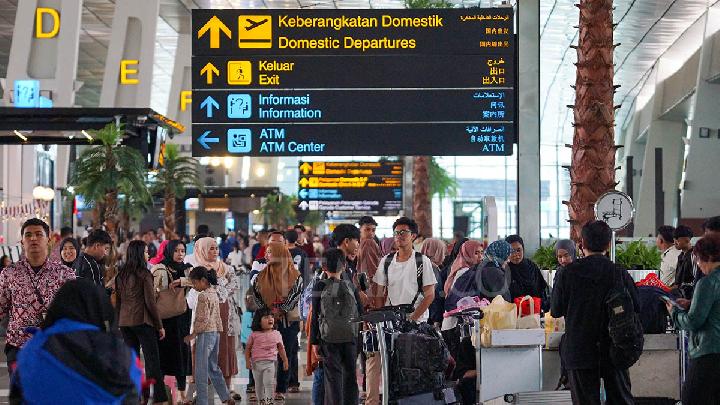TEMPO.CO, Jakarta - Donald Trump's second administration has entered the first 100 days, and the White House, though less vulnerable to leaks and retaliation than before, increasingly resembles his first term. Conflicts escalated, and embarrassing disclosures became commonplace.
Here are some facts about the chaos in the White House:
Elon Musk's Dispute
Axios noted that Donald Trump proudly introduced Elon Musk as one of his assistants at the beginning of his second term. The billionaire's involvement was once seen as a promising asset. However, such views are now fading. He often quarreled with other Trump aides.
Tensions recently exploded in the West Wing between Treasury Secretary Scott Bessett and Musk, culminating in a prolonged and heated debate over the appointment of an IRS commissioner.
Long before he announced a dramatic reduction in his government duties, many in the administration wanted Musk out.
Leak Scandal in Signal
The Pentagon is facing a leadership crisis under Defense Secretary Pete Hegseth. Several senior officials have been fired or have resigned. Many questions have been raised about Hegseth's capabilities, a former Fox News presenter with no government experience. He has been caught twice sharing sensitive military plans through Signal chats.
Tariff Policy Chaos
Some officials criticize Trade Advisor Peter Navarro, Commerce Secretary Howard Lutnick, and others for their tariff policies, which have triggered a global market downturn, even though these policies originated from Trump himself.
After causing economic anxiety by attacking the Federal Reserve and threatening to fire Chairman Jerome Powell, Trump has since softened his rhetoric towards the Fed and tariffs, at least for now.
Those inside the White House acknowledge that this tariff strategy has caused "pain" for American citizens due to strained trade relations and supply chain shifts. Economists warn that this will likely lead to price increases and potential shortages of goods ranging from cars to electronics to clothing.
However, officials argue that these difficulties are temporary and necessary to bring manufacturing back to the U.S. and force foreign partners to renegotiate trade deals. Meanwhile, the government is also pursuing deregulation, spending cuts, expanding oil drilling, and tighter immigration controls to curb inflation as Trump seeks to secure new trade agreements.
Economic Promises Marred by Trade Wars
According to Politico, on his first day in office, Trump was confident in persuading the Americans that addressing their primary concerns, lowering prices and stabilizing the economy, would be a priority. However, nearly 100 days later, many voters are still frustrated and impatient for tangible results.
Instead of providing economic relief, Trump's early months have been marked by turmoil. An aggressive trade war has disrupted financial markets, shaken consumer confidence, and raised concerns that the president's promise to usher in a new era of prosperity might instead lead the country towards a recession.
Public trust in Trump's economic management is waning. More and more people perceive his policy changes as excessive and dangerous. Even some of his supporters are concerned that his tariff-based approach risks raising prices and alienating his core political supporters.
The impact of Trump's tariff policies has been quick and severe. Recent pension portfolios have lost billions in value, and consumer sentiment has plummeted, signaling the end of the White House's initial goodwill.
Polls from the Pew Research Center show that Trump's approval of economic management is at its lowest point since taking office. With inflation expected to rise and job opportunities becoming scarcer, voter confidence is dwindling.
This economic unease is translating into political problems for Trump and the GOP. An Economist/YouGov poll found that half of Americans believe the economy has worsened since Trump's inauguration, and more than 40 percent give his first 100 days an "F" grade.
Trump's outside economic advisor, Stephen Moore, acknowledged this challenge: “Is it concerning? Sure it is. As a Republican that wants Trump to succeed, you need the political capital to move ahead your agenda.”
Perspectives on the Chaos
Marc Short, Trump's first-term Chief of Staff to Vice President Mike Pence, commented: "The president thrives in chaos, and that is part of his leadership style. However, I believe the first administration was more united in its policy objectives, whereas now we get a different explanation daily on trade policy and our position on the Middle East and Ukraine, etc."
Government officials disputed the wide agreement on major policies such as tariffs.
Trump's advisors said he does not plan to fire Hegseth or other senior officials. Instead, he tends to defend his loyalists when they face media scrutiny, empathizing with their challenges, similar to his past experiences.
A senior advisor said, "Telling him to fire someone is a sure fire way to make sure they don't get fired."
Editor's Choice: Canada's Mark Carney Wins in Election Overshadowed by Trump's Threats
Click here to get the latest news updates from Tempo on Google News



























:strip_icc():format(jpeg)/kly-media-production/medias/5102516/original/005925200_1737445029-WhatsApp_Image_2025-01-21_at_2.32.29_PM.jpeg)
:strip_icc():format(jpeg)/kly-media-production/medias/4586104/original/077515000_1695465780-caleb-woods-VZILDYoqn_U-unsplash.jpg)
:strip_icc():format(jpeg)/kly-media-production/medias/5064102/original/005025900_1735008236-pexels-elly-fairytale-3807560.jpg)
:strip_icc():format(jpeg)/kly-media-production/medias/4977375/original/022206900_1729665554-charlein-gracia-06f9TZl3fQY-unsplash.jpg)
:strip_icc():format(jpeg)/kly-media-production/medias/4894762/original/062268800_1721274778-ilustrasi_ibu_dan_anak-20220624-274-adrian.jpg)
:strip_icc():format(jpeg)/kly-media-production/medias/4548967/original/094336900_1692782124-tanaphong-toochinda-FEhFnQdLYyM-unsplash.jpg)
:strip_icc():format(jpeg)/kly-media-production/medias/5069370/original/059921200_1735303389-DSC02346.jpg)
:strip_icc():format(jpeg)/kly-media-production/medias/5048575/original/006782600_1734059966-pexels-josh-willink-11499-1157395.jpg)
:strip_icc():format(jpeg)/kly-media-production/medias/5064007/original/015244100_1735004343-pexels-yankrukov-4458320.jpg)
:strip_icc():format(jpeg)/kly-media-production/medias/5063608/original/058522100_1734955482-Screenshot_2024-12-23_185251.jpg)
:strip_icc():format(jpeg)/kly-media-production/medias/5063811/original/037704900_1734978437-pexels-cottonbro-4720373.jpg)
:strip_icc():format(jpeg)/kly-media-production/medias/5033227/original/083341800_1733204665-group-kids-friends-arm-around-sitting-together.jpg)
:strip_icc():format(jpeg)/kly-media-production/medias/5092819/original/015231600_1736818955-DSC02252.jpg)
:strip_icc():format(jpeg)/kly-media-production/medias/5057346/original/042967400_1734587841-children-sit-table-their-homework.jpg)
:strip_icc():format(jpeg)/kly-media-production/medias/5097558/original/037253400_1737090612-DSC02501.jpg)
:strip_icc():format(jpeg)/kly-media-production/medias/5057354/original/063497000_1734587961-happy-small-girl-using-smart-phone-while-having-lunch-with-her-family-home.jpg)
:strip_icc():format(jpeg)/kly-media-production/medias/4845164/original/017751400_1716882979-IMG_1333.jpeg)
:strip_icc():format(jpeg)/kly-media-production/medias/5076817/original/082804300_1735900100-Depositphotos_164785402_L.jpg)
:strip_icc():format(jpeg)/kly-media-production/medias/4987732/original/053808900_1730454915-Picsart_24-11-01_15-57-37-602.jpg)
:strip_icc():format(jpeg)/kly-media-production/medias/5047657/original/010073000_1733992466-Screenshot_2024-12-12_at_15.31.02.jpg)